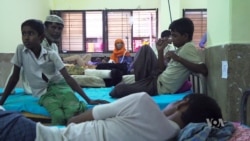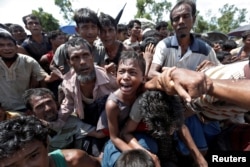As the mass exodus of Rohingya refugees fleeing Myanmar to Bangladesh slows, the focus has turned to reuniting families affected by the crisis. VOA spoke to relief workers and traumatized family members in Cox's Bazar, a fishing port in Bangladesh, about the future prospects for the refugee families.
Injured victims of the ongoing military crackdown in Myanmar outnumber the beds here at the main hospital in Cox’s Bazar.
Few families have been spared by what many observers are calling “textbook ethnic cleansing” perpetrated by Myanmar’s military in Rakhine state.
Six-year-old Fatima broke her leg jumping off the second floor of her burning home to flee a Burmese army attack. Now she barely talks, says her father Muhib Bullah.
"I’m feeling sad not only for my child but also for other children who have been killed by the military. The fathers of such children might feel sad for their children like me. The army raped many girls, beat and killed many people," Bulla said.
Many families were torn apart during the perilous journey across the border, leaving many youngsters without guidance and care.
Registering the children and tracing their families is the first priority for aid groups. But with more than 500,000 arrivals, the task is daunting, says Myriem el Khatib of the International Committee of the Red Cross.
"It’s difficult in terms of restoring family links to follow up on a person because they move a lot and they’re scattered around the different camps from Ookea to Teknaf, so locating them first and maintaining contact with them is complicated," Khatib said.
As injuries get treated, there are also plans for a mental health clinic for families suffering from severe trauma. For Dr. Shaheen Chowdhury of Sadar Hospital the challenge is unprecedented.
“We are doctors and we are human beings also and this is totally unbearable the pain they are suffering through. The situation they are going through is totally devastating. I haven’t seen this type of thing before,” Chowdhury said.
While Bangladesh prepares to build up existing camps for more than half a million new arrivals, many remain concerned that the unseen damages will not be looked after.






